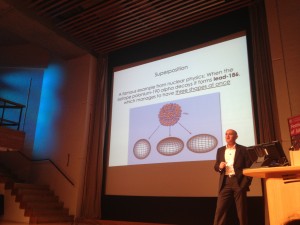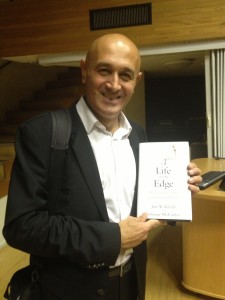WEDNESDAY, 29 OCTOBER 2014
The further you go in science, the more it breaks down into different parts, the more specialised you become and the more isolated you seem to become from other areas of scientific discovery. Yet, some of the biggest discoveries and the most exciting advances come from the places where different sciences meet. In his recent lecture, and upcoming book, Professor Jim Al Khalili of the University of Surrey revealed why he thinks that the emerging field of quantum biology may hold the key to a deeper understanding of life in the universe.Professor Al Khalili regularly appears on British television and radio as an expert in all things physics and has authored several popular science books. He is probably best known for BBC Radio 4 show The Life Scientific where he interviews some of the biggest names in modern science. In addition to his thriving research career, Professor Al Khalili has been actively engaging with the public since the 1990s. He sees engagement as a vital part of a scientific career, saying; ‘Why would you work so hard to discover something new and then not want to share that with other people?’ To him, outreach is not just as a way to inspire the next generation, but also a way to encourage people to identify solid evidence and think more rationally in their everyday lives. As the current President of the British Humanist Association, he was invited to give this years’ Sir Hermann Bondi Lecture as part of the Festival of Ideas.
 In recent years, Professor Al Khalili has been developing an academic interest in quantum biology. The study of quantum biology brings together particle physicists, chemists and biologists to understand how the intrinsic ‘weirdness’ and unpredictability of subatomic particles – quantum mechanics – can solve some of the problems we encounter in the study of living things. In science, all life is just a complex collection of chemical reactions, and all chemicals consist of atoms, which are ultimately described by quantum physics.
In recent years, Professor Al Khalili has been developing an academic interest in quantum biology. The study of quantum biology brings together particle physicists, chemists and biologists to understand how the intrinsic ‘weirdness’ and unpredictability of subatomic particles – quantum mechanics – can solve some of the problems we encounter in the study of living things. In science, all life is just a complex collection of chemical reactions, and all chemicals consist of atoms, which are ultimately described by quantum physics.Even now though, biologists prefer to try to explain life using ideas of physics that are more than two centuries out of date. Whilst this works fine most of the time, classical physics only roughly describes the real world, so every now and then, something in biology just doesn’t quite add up. This is where quantum physics comes in, and so quantum biology is born.
Quantum biology, like many sciences in their infancy, has a rather mottled and shady past. It started out in Germany, 1932 with a physicist Pascual Jordan. Jordan, however, signed up with the Nazi party and so ultimately much of his work was buried or ignored. The idea returned in the 80s when Sir Roger Penrose proposed that quantum effects on structures called microtubules could explain the origin of consciousness. The idea being that since both quantum science and consciousness were equally difficult to understand they must be somehow linked. The suggestion was highly controversial, had little supporting evidence and has been rejected by the wider scientific community. Similarly, quantum physics is often used in pseudoscience as an explanation for everything from aliens and ESP to homeopathy.
 Real quantum biology, according to Professor Al Khalili, got started with the work of Judith Klinman a biochemist trying to learn how chemicals react so quickly inside living cells. Klinman discovered that proteins called enzymes, which speed up chemical reactions, were probably using an effect called quantum tunnelling to improve their efficiency. This is still one of the most solid ideas in quantum biology.
Real quantum biology, according to Professor Al Khalili, got started with the work of Judith Klinman a biochemist trying to learn how chemicals react so quickly inside living cells. Klinman discovered that proteins called enzymes, which speed up chemical reactions, were probably using an effect called quantum tunnelling to improve their efficiency. This is still one of the most solid ideas in quantum biology.Having faster biology is great, and undoubtedly key to the survival of all life, but what else does quantum biology have to offer? It seems to be the best explanation of how birds migrate by detecting magnetic fields and using them for navigation, something classical biology has repeatedly failed to fully explain. Quantum biology makes plants more effective at harvesting sunlight and, more speculatively, could explain our sense of smell. Recent work by some of Professor Al Khalili’s colleagues has also shown that quantum physics can even alter our genes, but this particular effect is so infrequent that it probably doesn’t really do much to affect our lives.
Quantum biology is still a small area, but as we continue to expand our knowledge of the living world, studying life in progressively finer detail, it is certain that quantum uncertainty will be needed to help us make sense of everything. The lecture closed with a prediction that ‘in the next five years, quantum biology will be a huge growth area’ and who knows what great discoveries and advances can be made when all aspects of science work closely together.
Professor Jim Al Khalili’s latest book, Life on the Edge: The Coming of Age of Quantum Biology co-authored by Johnjoe McFadden is produced by Bantam Press and will be on sale from November 6th.
Article written by Jonathan Lawson.
